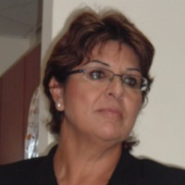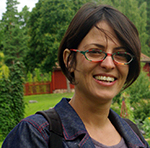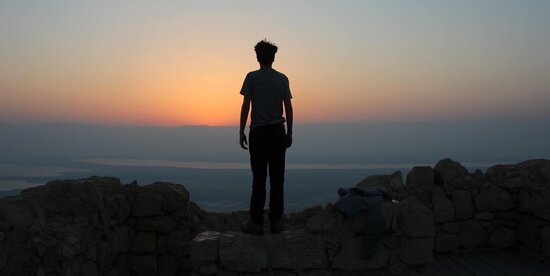12
Jul 2021
A Conversation on Trauma
WIF Alum Esti Ben-Artzi Bitton (Class 9) and Deputy Director Dana Savoray-Hadar
Recently Deputy Director of The Wexner Foundation in Israel and WIF Alum Dana Savory-Hadar (Class 17), sat down with fellow Alum Esti Ben-Artzi Bitton (Class 9) to discuss her role in helping others in Israel process grief. This is their conversation.
Dana Savoray-Hadar: As an expert in the field of trauma and loss, where have you seen these issues in the past year during the Coronavirus Pandemic?
Esti Ben-Artzi: I am a social worker and have been dealing with the physical, emotional, mental, and social ravages of war for nearly 40 years. Over this period, I have come across many who struggled with the trauma of war: soldiers with post-traumatic stress disorder, bereaved families, IDF veterans with disabilities, civilian casualties of terror, and many more. The initial anxiety during this time stemmed from a fear of dying. Typically people who had experienced anxiety early on were those whose life had an aspect of instability like people who had just started a new job or single mothers who must rely on themselves. Anxiety was also heightened in bereaved families and among Holocaust survivors, whose lives had also previously been touched by loss. There was also anxiety related to the possibility of permanent loss of work – if I am not reinstated, how am I to survive? How am I going to support my family? It took a while for the State to come up with solutions while the levels of anxiety climbed.
This ongoing state of affairs eroded the short-term defense mechanisms we naturally call to our aid, such as repression or denial. People found themselves bursting out in tears for no apparent reason. Our job as mental well-being professionals was to impress upon them that this was the result of weakened defense mechanisms. The weaker the family or social support, the quicker this happened
Another aspect of trauma was linked to the enforced separation from the elder generation. Not being able to say our final farewells to loved ones who’ve passed away from the Coronavirus was, in my opinion, the hardest aspect of this crisis. The shutdown of synagogues was difficult as well – I experienced this through conversations with my own father, an elderly man whose daily routine pretty much centers around going to synagogue – and this too was taken away from him. It took him some time to come to terms with this and to accept that God is fine with him praying at home
There was also extreme anxiety stemming from fear of proximity. I treated a woman who worked as a dental hygienist and was terribly afraid of getting the virus from her patients. At first she told them that she could not perform the treatments and gradually she just stopped leaving the house altogether. Children and adolescents lost a lot in the Coronavirus pandemic as they were without proper schooling for a long period of time. For many of them, school is a safe haven from life at home; the one place they get a warm meal and warm words and get some sense of security. For them the loss was particularly harsh. However, even among children that have fully functional families and had the opportunity to enjoy quality time with their parents, anxiety and fear manifested in the wake of the second lockdown. Many thought, “What if things never go back to the way they were?”
Dana: What aids did you employ for dealing with the trauma and helping others do so successfully?
Esti: I remember the shock and terrible sadness following the news of the high numbers of deceased in Brooklyn’s Jewish community. It shocked me horribly. For consoling and guidance, I turned to Rabbi Manis Freidman, who is an American Chabad Rabbi. He would post short daily sermons that instilled strength, faith, and a sense of control.
Professor Mooli Lahad, who specializes in mental resilience and dealing with loss, has developed a model using the acronym PEM FIFS for dealing with emotional crises. Every individual has his or her way of dealing with stress and crises and it is important to know what tools we can remember in such events.
- P – Physical: do more physical activity, even dancing, as this is a critical means for dealing with stress.
- E – Emotion: some people find an outlet for their stress by expressing feelings, crying, or laughing.
- M – Mental: some people find that learning the facts and educating themselves on the situation helps.
- F– Family: family can be an invaluable source of strength during a crisis.
- I – Imagination: it is extremely important to be able to visualize the good things that await once the crisis is over. For example, (“It’ll be wonderful when we can hug again.”)
- F – Faith: spiritual or religious faith is an important source of strength.
- S – Social: during a crisis, many people find support in their social circle and community. Indeed one of the biggest challenges of the pandemic was learning to interact socially without the physical proximity.
This system has become an essential component of my toolkit when working during the Coronavirus crisis. I have recommended that families apply this tool together.
Dana: On the heels of the Corona vaccination drive, we witnessed the Miron disaster and after that, the Guardian of the Walls military operation.
Esti: The pandemic actually uncovered the full extent of the mistrust that exists in Israel’s society. The question of whether we are indeed one people came up, and this issue became even more controversial during the Guardian of the Walls operation. Even now, as people have already gotten their vaccinations and the operation is over, this is still an issue.
Israel is a country that has had its fair share of trauma and its citizens always seem to be expecting the next one just around the corner. Events transpired faster than we were able to process. The Coronavirus had just begun to abate and the Miron disaster occurred, taking 45 lives with it. Barely a week later, when it was no longer the topic de jour, the Guardian of the Walls operation began.
It’s very important to address these kinds of things, even within the family, to be able to share our difficulties through trying times. When you don’t talk and keep it inside, the trauma might become deeper from lack of processing.
Dana: How do you view our return to normal life?
Esti: A gradual return is extremely important as it is what lets us process the events. If we plunge back into our normal routine, the outcome is amnesia of sorts. We delete the events from our minds without having processed them properly and it might meet us unprepared next time. Therefore, it’s important to take the time – even when getting back to the office – to talk and share our ways of dealing with things and the lessons we‘ve learned along the way. The most valuable lesson of the pandemic, in my opinion, is the ability to preserve the relationships among us. In normal times we don’t always notice the importance of our relationships with others; of how safe people can feel with each other to the extent that if they are in trouble or some kind of distress, we will be there for each other and ensure people are not alone. During the Coronavirus pandemic, many felt they might end up totally alone. These are things that demand processing upon our emergence from the crisis. This matters on a personal level as well as a national level, otherwise how can we create that sense of trust that is so necessary for facing the next crisis united?
Dana: Now we are on the eve of Tisha B'Av. Since you're from a conservative background, do these insights tie into this holiday?
Esti: Absolutely. In the past, we were in great danger of the destruction of the Temple – our house of faith – and now many have in fact experienced the destruction of their houses. The destruction of the Temple comes from senseless hatred and I think this kind of danger still exists. There was a sense of anxiety among people, distrust, war against each other and a feeling of being particles – each to himself. The Coronavirus threatened our relationships and gave us an opportunity to think about them – between all parts of Israeli society and among world Jewry, in Israel and in the Diaspora. We must learn to see each other's needs and understand, accept and be in touch with these needs, even when we criticize each other, with acceptance and free love. Without it, the commemoration of the destruction of the Temple is not enough. It's our duty to ensure there will not be further destruction. Always, and more so through this current challenges, personal responsibility and mutual responsibility are the order of the day.

Get To Know The Author
WIF Alum Estee Ben-Artzi Bitton (Class 9) is a Social Worker at the Prime Ministers' Office.

Photo by Lorenzo Maimone on Unsplash
Get To Know The Author
WIF Alum Dana Savoray-Hadar (Class 17) is the Deputy Director of The Wexner Foundation in Israel.

